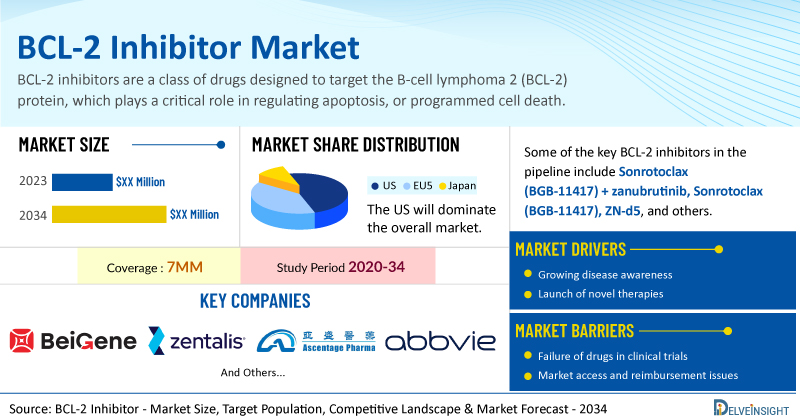New York, USA, Aug. 05, 2024 (GLOBE NEWSWIRE) -- DelveInsight’s report includes a comprehensive understanding of current treatment practices, emerging BCL-2 inhibitors, market share of individual therapies, and current and forecasted BCL-2 inhibitor market size from 2020 to 2034, segmented into 7MM [the United States, the EU4 (Germany, France, Italy, and Spain), the United Kingdom, and Japan]. Discover which therapies are expected to grab the BCL-2 inhibitor market share @ The BCL-2 inhibitor market has experienced significant growth due to its potential to address various cancers.
One key dynamic in the BCL-2 inhibitor market is the , which drives demand for effective treatments. As the such as CLL and NHL rises, there is a continuous that offer better outcomes and fewer side effects compared to traditional treatments. This fuels the market, attracting pharmaceutical companies to explore and develop new BCL-2 inhibitors.

The is another important aspect of market dynamics. Established players like , with their leading BCL-2 inhibitors, face competition from emerging biotech firms developing next-generation therapies. These newer therapies aim to overcome limitations such as resistance and improve efficacy.
Additionally, involving BCL-2 inhibitors are gaining traction, as they offer the potential to enhance treatment outcomes by targeting multiple pathways involved in cancer progression. Regulatory factors also play a crucial role in shaping the market. The are generally rigorous, with extensive clinical trials required to demonstrate safety and efficacy.
However, can expedite the availability of these treatments for patients with unmet needs. As regulatory bodies continue to streamline processes for innovative therapies, the pace of market entry for new BCL-2 inhibitors is likely to increase. Finally, are influencing market dynamics.
The poses challenges for healthcare systems and patients, prompting discussions about pricing strategies and access. are critical factors that impact market adoption. Companies are working on strategies to address these concerns, including patient assistance programs and pricing adjustments, to ensure broader access to these life-saving therapies.
Treatment with BCL-2 inhibitors, like venetoclax, is mainly used for managing specific blood cancers where abnormal apoptosis regulation plays a role in disease development. These inhibitors are approved for conditions such as chronic lymphocytic leukemia, small lymphocytic lymphoma, and acute myeloid leukemia in certain patient groups. Choosing patients for BCL-2 inhibitor therapy involves evaluating factors like the type and stage of the disease, genetic markers, previous treatments, and overall health.
These drugs are often prescribed for relapsed or resistant cases, as well as for initial therapy in specific scenarios. BCL-2 inhibitors are commonly combined with other cancer treatments to boost effectiveness, including chemotherapy, immunotherapy, targeted therapies, or other new agents. The specific combination depends on the cancer type and patient profile.
During treatment with BCL-2 inhibitors, patients are regularly monitored to assess how well the treatment is working and to track disease progression. This monitoring typically includes imaging, blood tests, and clinical evaluations, with response criteria varying by cancer type and treatment objectives. The length of BCL-2 inhibitor treatment depends on the disease's response, tolerability, and therapeutic goals.
Some patients may have continuous therapy, while others might switch to intermittent or maintenance therapy after remission. In summary, BCL-2 inhibitor therapy offers a targeted strategy to trigger cancer cell death, providing promising treatment options for certain blood cancers. Learn more about the FDA-approved BCL-2 inhibitor @ Several key players, including (Sonrotoclax (BGB-11417) + zanubrutinib; Sonrotoclax (BGB-11417)), (ZN-d5), and others are involved in developing drugs for BCL-2 inhibitors for various indications such as relapsed or refractory chronic lymphocytic leukemia or small lymphocytic lymphoma, Waldenstrom macroglobulinemia and others.
Sonrotoclax is an investigational small molecule that inhibits B-cell lymphoma-2 (BCL-2). It represents a promising second-generation BCL-2 inhibitor for treating hematologic cancers, potentially overcoming venetoclax resistance caused by BCL-2 mutations. As a member of the BCL-2 homology 3 (BH3) mimetics class, sonrotoclax has shown strong activity and high selectivity against the antiapoptotic protein BCL-2 in preclinical and IND-enabling studies.
Compared to venetoclax, sonrotoclax is more potent and selective for BCL-2 over BCLxL. Currently, sonrotoclax is being evaluated in several clinical trials. ZN-d5 is a targeted, oral small molecule designed to inhibit B-cell lymphoma-2 (BCL-2) selectively.
It is under evaluation in patients with blood cancers. Developed by Zentalis Pharmaceuticals, ZN-d5 aims to offer superior potency, selectivity, and pharmacokinetic properties. Presently, ZN-d5 is undergoing a Phase I/II trial in combination with azenosertib for treating relapsed or refractory acute myeloid leukemia.
The anticipated launch of these emerging therapies are poised to transform the BCL-2 inhibitors market landscape in the coming years. As these cutting-edge therapies continue to mature and gain regulatory approval, they are expected to reshape the BCL-2 inhibitors market landscape, offering new standards of care and unlocking opportunities for medical innovation and economic growth. To know more about BCL-2 inhibitor clinical trials, visit @ BCL-2 inhibitors are a class of drugs designed to target the B-cell lymphoma 2 (BCL-2) protein, which plays a critical role in regulating apoptosis, or programmed cell death.
Overexpression of BCL-2 is often observed in various cancers, where it contributes to tumor survival and resistance to conventional therapies by inhibiting the apoptotic pathways. By binding to the BCL-2 protein, these inhibitors restore the apoptotic process, thereby promoting cancer cell death and enhancing the efficacy of other treatments. The development and clinical use of BCL-2 inhibitors represents a significant advancement in targeted cancer therapy.
These inhibitors not only offer a more precise mechanism of action compared to traditional chemotherapies but also tend to have a more favorable safety profile. However, the application of BCL-2 inhibitors is not without challenges. Resistance to these drugs can develop, necessitating combination therapies and ongoing research to optimize their use.
Additionally, understanding the specific molecular and genetic contexts in which BCL-2 inhibitors are most effective remains a crucial area of study, as personalized approaches to cancer treatment become increasingly important. Discover more about BCL-2 inhibitor drugs in development @ report delivers an in-depth understanding of the disease, historical and forecasted epidemiology, as well as the market trends, market drivers, market barriers, and key small lymphocytic lymphoma companies including among others. report delivers an in-depth understanding of the disease, historical and forecasted epidemiology, market share of the individual therapies, and key non-hodgkin’s lymphoma companies, including , among others.
report provides comprehensive insights about the pipeline landscape, including clinical and non-clinical stage products and the key non-hodgkin’s lymphoma companies, including , among others. report delivers an in-depth understanding of the disease, historical and forecasted epidemiology, market share of the individual therapies, and key Hodgkin lymphoma companies, including , among others. report provides comprehensive insights about the pipeline landscape, including clinical and non-clinical stage products, and the key Hodgkin lymphoma companies, including , among others.
DelveInsight is a leading Business Consultant and Market Research firm focused exclusively on life sciences. It supports pharma companies by providing comprehensive end-to-end solutions to improve their performance. Get hassle-free access to all the healthcare and pharma market research reports through our subscription-based platform PharmDelve.

















